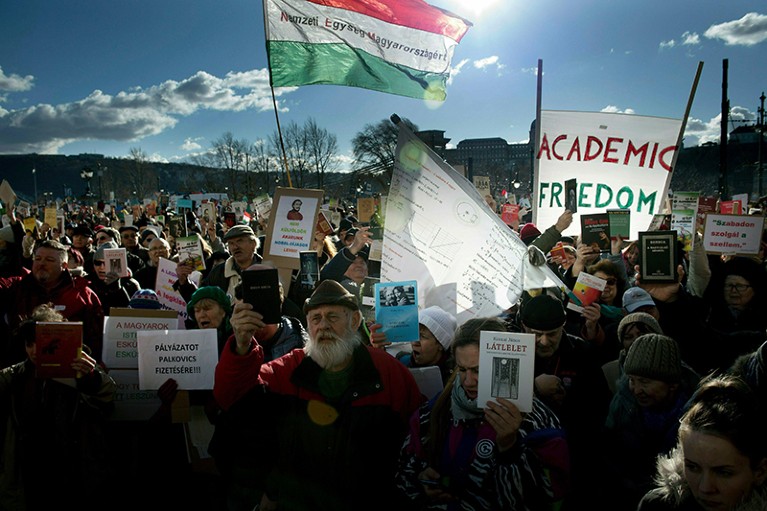
Demonstrators in Hungary protest against the reorganization of the Hungarian Academy of Sciences in 2019.Credit: Szilard Koszticsak/AP/Alamy
Researchers in Hungary worry that the country could be facing brain drain in science, after the European Union suspended funding for research projects at some universities.
In December 2022, the Council of the European Union, a group of government ministers from each of the EU’s 27 countries, agreed to freeze funding for research and exchange programmes — amounting to around €6.3 billion (US$7 billion) — for higher-education and cultural institutions in Hungary, including 21 universities.
All of the institutions are run by public-interest trusts, a management model introduced in 2021 by the Hungarian government when it restructured higher education. The model handed control of institutions to boards of government-appointed trustees, which the EU argued breached principles of the rule of law.
The European Council ban applies to Horizon Europe, the world’s largest international research and innovation programme, worth around €95.5 billion a year. It also affects the Erasmus+ Programme for student and doctoral-candidate exchanges. The programme helps young people in Europe to further their education, receive career training and participate in sports, and has a budget of €26.2 billion each year.
A survey of 524 early-career academics at Hungarian universities and research organizations, published in June, found that 25% had started or planned to look for jobs abroad, and more than one-third said they had experienced negative consequences since the ban came into effect.
All respondents had PhDs and were 31 to 45 years old. The results were published by the Hungarian Young Academy, an organization affiliated with the Hungarian Academy of Sciences that aims to support young researchers.
Impact on early-career scientists
Almost 9% of respondents who had active EU grant applications at the time of their response said that, although their institutions were not affected by the suspension, international partners had wanted to exclude them from already-running consortia. All of these respondents said that they had managed to convince their collaborators to let them participate.
One in five of those polled said communication with international collaborators had become more difficult; many had been asked to change their job or affiliation so they could stay in a collaboration.
Survey co-author Balázs Lengyel, an economic geographer at the Centre for Economic and Regional Studies in Budapest, says the results offer anecdotal evidence that some national funders in Europe have signalled that having a Hungarian partner in a consortium could be a disadvantage. “Many of us worry that this situation stigmatizes Hungarian researchers, and we are pushed back within the European Research Area [the system of programmes integrating scientific resources across Europe], to which we belong,” he adds.
Finally, 16% of respondents said they had already considered changing their affiliation or seeking further affiliations in Hungary.
The authors conclude: “Our data clearly indicate that early-career researchers have realized that the restrictions will not only mean limited access to funding, but also the weakening of their research networks, the isolation of the Hungarian scientific community, and reduced training opportunities.”
“These findings highlight that the international reputation of Hungarian science has been dealt a body blow by the suspension.”

Balázs Lengyel fears that Hungarian scientists will be unfairly excluded from European research programmes.Credit: Balázs Lengyel
Survey co-author Imola Wilhelm, a biologist at the Biological Research Centre at Szeged, Hungary, who co-chairs the Hungarian Young Academy, says the situation has left early-career researchers in the country feeling isolated at a crucial time in their careers, when they are establishing their professional networks across Europe. The ban is affecting Hungarian universities and research institutes that are not officially excluded, she adds.
Katalin Solymosi, a plant biologist at Eötvös Loránd University in Budapest, warns that excluding young researchers — including Erasmus+ students — means that international collaborations and networks will suffer in the long term. “Restoring lost networks and collaborations or trust is much harder than destroying it,” she adds.
Academic freedom
The report notes that the funding suspension was triggered by a perceived erosion of transparency and academic freedom in Hungary.
The EP Academic Freedom Monitor 2023, carried out by the European Parliamentary Research Service (EPRS) and published in February, reviewed academic freedom in ten EU member states, including Hungary, and concluded that Hungary (alongside seven other EU countries) had seen a “statistically significant decline in academic freedom or aspects thereof” during the previous ten years.
The report says: “Special attention is needed for the situation in Hungary where the level of academic freedom has fallen further in recent years and is low compared not just to all other EU Member States, but also globally (the bottom 20–30% of countries worldwide).”
Out of the ten countries studied, only in Hungary had the report’s authors identified “systemic and structural infringements of academic freedoms”.
According to Freedom House, a political advocacy non-profit organization in Washington DC, these infringements include the revocation of accreditation and funding for gender-studies programmes by Prime Minister Viktor Orbán’s government, led by the right-wing Fidesz party. In 2019, Orbán’s government stripped the 200-year-old Hungarian Academy of Sciences of its network of research institutions.

Katalin Solymosi worries that damaged international collaborations will be difficult to repair.Credit: Bea Bulla
László Bódis, deputy state secretary for innovation at Hungary’s Ministry of Culture and Innovation, told Nature: “The Hungarian government developed a detailed proposition and submitted it to the Commission to ensure that Hungarian students and researchers are not excluded from the European research scene for the sole purpose of political expediency.”
“It is regrettable and outrageous that Hungary still has not received any feedback on these proposals from the Commission since last November, that is for nine months.”
Damage limitation
In June, the EU sought to clarify its position, stressing that Hungarian researchers can still take part in Horizon Europe projects, even if their institution cannot apply for funding from the programme.
The ban means Hungarian researchers based at any of the 21 affected universities cannot access EU funding, but they can still participate in Horizon Europe projects.
Meanwhile, the government in Hungary has made moves to try to plug the gap created by the funding freeze. The Budapest-based National Research, Development and Innovation Office (NKFIH) — a government body that provides public funding for research and development — has set up a ‘governmental guarantee fund’ to cover the Hungarian financial contributions to research projects that have been accepted by the Horizon Europe scheme but are unable to receive funds following what it calls the EU Commission’s “discriminatory decision”.
An initial budget of €13 million for 2023 and €20 million for 2024 was set aside for this by the Hungarian government for affected projects.
There is also the HU-RIZON International Research Excellence Cooperation Programme, which offers grants from an overall budget of €20 million to higher-education institutions to promote the formation of Hungarian-led international research consortia.
So far, 57 projects at 14 universities have been implemented with funding from the guarantee fund, and this year, 12 proposals have been submitted to HU-RIZON.
Lengyel says: “Although these new funding schemes might help important research, Hungarian universities and research organizations should be able to participate and compete in European calls.
“There is no doubt that it is difficult to develop the international competitiveness of the Hungarian science and innovation ecosystem without these opportunities.”
Academics and researchers are sceptical that the issue will be solved quickly, but agree that efforts should continue.
Wilhelm says: “I am pessimistic about the long-term effects. Even if the decision is reversed, it is unlikely that those who have left the country will return, and the negative perception of the Hungarian research community will not be immediately alleviated.”
Gábor Kemenesi, a virology researcher at the University of Pécs in Hungary, also has a downbeat view, but says: “Things like this new study have finally got some data which we can show. Data and opinions like this are important because they can reach both sides of the political negotiation. This could be solved.”
Continued discussion between the EU and the Hungarian government should be encouraged, argues Lengyel: “An open discussion is needed, including all involved parties and the Hungarian academic community as well, whose reputation and opportunities are at stake but, in my opinion, have been largely ignored so far.”
